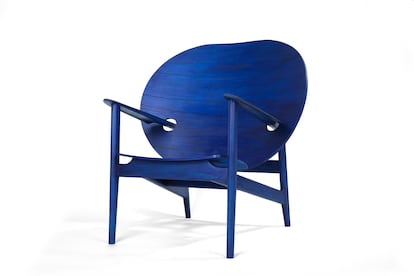Mac Collins: From graffiti artist to Afrofuturist designer
The 27-year-old from Nottingham synthesizes his dual heritage with pieces that allude to his African-Caribbean ancestry: ‘I am both Black and white. And that’s a precious thing: not having to choose’


He hasn’t “yet” been to Jamaica, where his grandparents emigrated from, he says. British designer Mac Collins, 27, is proud to represent the new face of the United Kingdom as a native of Nottingham with African roots and a family history that can be traced back to the Caribbean. Speaking recently at the Madrid Design Festival, he defined himself as “absolutely British, in a different kind of Britain, that is. A bigger and more complex one.” Collins noted that the UK today is made up of many people like himself “with two heritages: I am both Black and white. And that’s a precious thing: not having to choose.” Are people like himself agents of change? “I hope so, our jobs are changing us. These days, we can be creative.”
His paternal grandmother moved to the U.K. from Jamaica to work in a factory. The other grandparents “changed jobs so much that I couldn’t say what they did.” His father works as a security guard, and he is the youngest of seven siblings, the rest of whom are all girls. He is also the only artist in the family. “I didn’t have to fight for anyone’s love, but when I was young, I was afraid that my family wouldn’t take my profession seriously.”

The first thing he designed, as a graduation project, was a throne. His Iklwa chair, he said, is both a tribute to non-Western cultures and tradition: “you cannot be avant-garde without history, you cannot break what you have not built.” It is true that the chair-throne does not seem to come from the 21st century: it has the quality of timeless designs. “We live in a world so intangible that I needed to do something with my hands,” he confessed. Collins believes that as he becomes increasingly confident, he may become more interested in abstraction. “But I am a perfectionist: I cannot do abstraction without knowing the figuration.”
Collins’ career began on the streets as a teenager. He then went on to study at Northumbria University, where he graduated in 2018. “As a graffiti artist I painted landscapes, a place to go.” As a matter of fact, the Iklwa chair is also a place. “It was a teacher who gave me the push. He told me that I had talent and that I had to work hard. And I believed it.” Shortly after graduating, he was commissioned by the Design Museum to create another chair and it was put in production by the British company Benchmark. They are artisan pieces, classic and groundbreaking at the same time, and they have given Collins a professional boost: “I went from having a job selling clothes all day to being able to afford to work only part-time. For me, earning a living is basic. It’s not just about supporting myself, but about being able to help other people.”
Collins wants to contribute to building a new material culture. His Domino armchair — exhibited at the Side Gallery in Barcelona — alludes to the unhurried life of the Caribbean that his grandparents brought to the UK: the time spent wasting time, playing and being with friends that the post-industrial consumer society seems to consider useless. Collins wrote a thesis on Black creators. “I needed to know those other stories.” And he describes his own work as Afrofuturism. “I needed to explore my history.” These days he lives in Newcastle. Is London too expensive for young designers? “It’s that and also my friends, my family and my distance. We’ll see what happens in the future.”
Sign up for our weekly newsletter to get more English-language news coverage from EL PAÍS USA Edition
Tu suscripción se está usando en otro dispositivo
¿Quieres añadir otro usuario a tu suscripción?
Si continúas leyendo en este dispositivo, no se podrá leer en el otro.
FlechaTu suscripción se está usando en otro dispositivo y solo puedes acceder a EL PAÍS desde un dispositivo a la vez.
Si quieres compartir tu cuenta, cambia tu suscripción a la modalidad Premium, así podrás añadir otro usuario. Cada uno accederá con su propia cuenta de email, lo que os permitirá personalizar vuestra experiencia en EL PAÍS.
¿Tienes una suscripción de empresa? Accede aquí para contratar más cuentas.
En el caso de no saber quién está usando tu cuenta, te recomendamos cambiar tu contraseña aquí.
Si decides continuar compartiendo tu cuenta, este mensaje se mostrará en tu dispositivo y en el de la otra persona que está usando tu cuenta de forma indefinida, afectando a tu experiencia de lectura. Puedes consultar aquí los términos y condiciones de la suscripción digital.








































